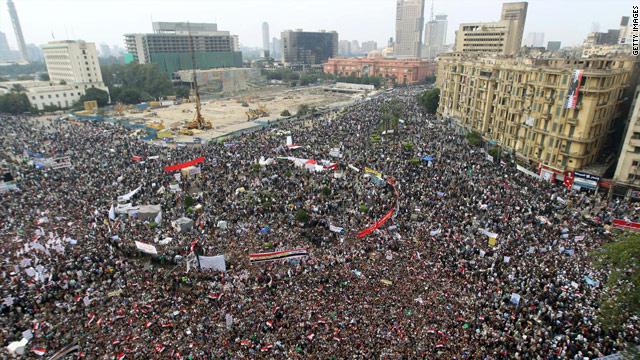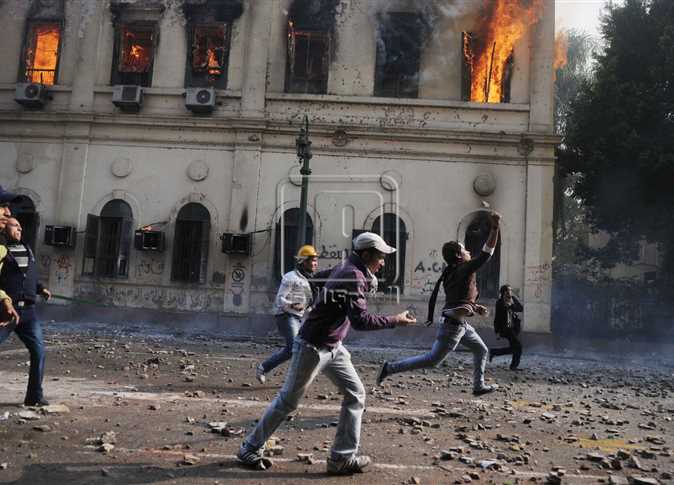The opposition voiced mixed feelings Friday over President Hosni Mubarak’s decision to delegate his powers to his deputy and the military’s communique, which fell short of meeting the public demand to oust Mubarak.
After a speech that offered five constitutional amendments, but fell far short of protesters’ demands, some opposition forces read the Armed Forces’ statements as evidence the military had sided with Mubarak.
But some are still optimistic that the army could side with the people.
“The army is not protecting Hosni Mubarak; it is backing constitutional legitimacy and reforms from within the existing constitutional order,” said Amr al-Shobaki, an expert with Al-Ahram Center for Political and Strategic Studies.
“Military statements have been reassuring; they open the door for a peaceful transfer of power and imply a recognition of the civility of the next president,” said al-Shobaki referring to the army’s promise to safeguard the transition of power in a way that would “realize the free democratic society that people aspire for.”
“Mubarak is over and done with,” he added. “The challenge is whether the military will be able to convince the people that it is going to be the guarantor of peaceful transition of power.”
Reformist Mohamed ElBaradei tweeted about his hopes for the army.
“People power can't be crushed. We shall prevail. Still hope army can join,” ElBaradei wrote on his Twitter page shortly after the military issued its second statement on Friday. “Protests and strikes are our basic rights and the only available tool to topple the regime," he added.
During his speech, Mubarak delegated several powers to his vice president and announced that he would amend five constitutional articles including the ones on the eligibility conditions for presidential candidates and the number of terms a ruler can serve. Mubarak also mentioned Article 88, which concerns the judicial supervision of elections as well as Article 93, which grants the parliament power to decide the legitimacy of the parliamentary membership. That provision had allowed the parliament to drop hundreds of court verdicts that challenged the legitimacy of parliamentary members.
He also ordered the amendment of Article 189, which specifies the mechanism of introducing constitutional amendments and the abolition of Article 179, long decried by civil society activists as a flagrant infringement of human rights.
But the changes meant little to thousands of protesters who are outraged by Mubarak’s refusal to quit. Many demonstrators marched to the Presidential Palace in Heliopolis and the television building Thursday night, with their numbers growing Friday. A few hours later, the military issued a statement acknowledging Mubarak’s deferral of duties to his deputy and promising to ensure the implementation of constitutional amendments and the end of the state of emergency. The armed forces had earlier pledged free and fair presidential elections this fall.
The president’s tone could complicate the military’s mission.
“Mubarak’s speech was provocative and incendiary. It also showed that he belittled the people. He is still talking as if he was still in charge and had nothing to do with the crimes committed for the last two weeks,” said al-Shobaki.
Such attitude has provoked hundreds of thousands who took to the streets Friday in different provinces to reiterate their demands.
Earlier today, the Muslim Brotherhood issued a statement dismissing Mubarak’s speech as “shocking” and “deceitful”. The Islamist organization insisted that Mubarak step down contending “the revolution” would not cease until Mubarak leaves.
As for the secular opposition, the reaction was similarly defiant.
"Mubarak's resignation and the toppling of the regime are the only demands that if heeded can end the sit-in of Tahrir Square," Hussein Abdel Razeq, a senior leader of the left-wing Tagammu Party told Al-Masry Al-Youm.
Lately, public outrage has taken an alarming detour after workers from different sectors joined in. Thousands of railroad and petroleum workers went on strike raising political as well as economic demands.
“I was expecting the military to side completely with people’s demand and force the president to leave,” added Abdel Razek.
Some analysts are weary of the public obsession with Mubarak’s resignation.
“Mubarak’s delegation of power is the best way out for Egypt. If he resigns now, we will have presidential elections in 60 days. We will not have time to make any changes,” says Amr Hamzawy, an expert with Carnegie Endowment for International Peace and the official spokesman of the Wise Man Committee recently formed to mediate between the opposition and the regime.
Many liberal voices hold that the president should stay in office until he rubber stamps required constitutional amendments, namely Article 76, which imposes draconian eligibility conditions on potential presidential candidates. Earlier this week, Mubarak had entrusted a commission of 11 jurists with introducing a set of constitutional reforms that will ease restrictions on candidates, limit the number of presidential terms and ensure full judicial monitoring of the elections.
Under the current constitution, the president has to stay in power, at least nominally, in order to pass these amendments. Under the latest arrangements, the president has become a “ceremonial leader”, said Hamzawy.




